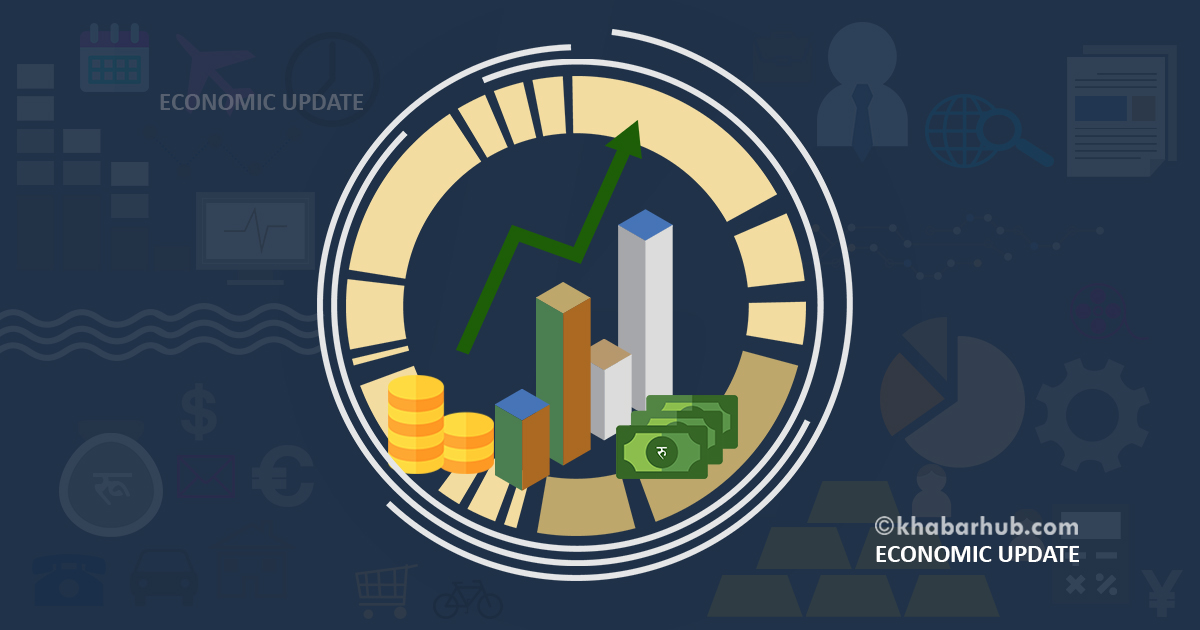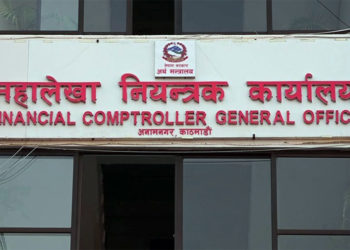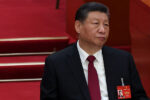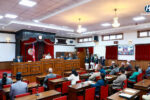KATHMANDU: Economic Digest offers a concise yet comprehensive overview of significant business happenings in Nepal, presented in easily digestible summaries.
Nepal’s recent developments reflect a complex interplay of cautious optimism, institutional reform, and persistent structural challenges. While Finance Minister Bishnu Prasad Paudel cited signs of economic stabilization and highlighted infrastructure commitments like the Siddhababa Tunnel, broader macroeconomic issues persist, as a reform panel blamed lax post-COVID monetary policies for ongoing instability.
Prime Minister KP Sharma Oli emphasized development, political stability, and agricultural modernization, yet projects like the Nagdhunga and Sunkoshi tunnels remain stalled due to local disputes.
Meanwhile, financial markets are expanding with a surge in share-backed loans, and green energy initiatives are progressing through partnerships like IPPAN and PLA’s taxonomy study.
However, environmental degradation threatens tourism, 5G rollout faces financial and infrastructure hurdles, and regional trade tensions are rising, particularly with India over oil imports. These issues underscore Nepal’s dual need for immediate policy coherence and long-term strategic planning.
Finance Minister: Economic indicators show positive shift
Deputy Prime Minister and Finance Minister Bishnu Prasad Paudel stated that Nepal’s economy is gradually recovering, attributing this to efforts made since the current government took office.
Speaking in Palpa, Paudel noted that earlier negative trends are now stabilizing. He defended the delay in appointing a new NRB governor, claiming it would yield better long-term outcomes. He also promised timely completion of the Siddhababa Tunnel, which aims to improve road safety in the region.
IPPAN, PLA join forces for Green Energy Policy Study
The Independent Power Producers’ Association of Nepal (IPPAN) and Pioneer Law Associates (PLA) have signed an MoU to conduct a study on green taxonomy for hydropower projects.
The initiative aims to support climate financing and carbon trading while guiding policy for Nepal’s goal to generate 28,500 megawatts of clean energy. A joint team will oversee the study, expected to be completed by August 2025.
PM Oli vows development, denounces disruptive politics
Prime Minister KP Sharma Oli reaffirmed his administration’s commitment to development and good governance during a CPN-UML event in Damak, Jhapa. Taking a veiled jab at activist Durga Prasai, Oli criticized elements he described as disruptive to democratic stability.
Rejecting any prospects of monarchy’s return, he emphasized the importance of political steadiness. The PM also unveiled plans for agricultural modernization, entrepreneurship support, and forthcoming ordinances, including one addressing land reform.
He urged UML members to expand grassroots engagement under the “Prosperous Nepal, Happy Nepali” vision.
Share-backed lending jumps by Rs 28.4 billion in 7 months
Nepali banks have significantly increased their lending against shares, adding Rs 28.4 billion in the first seven months of the current fiscal year, according to Nepal Rastra Bank.
Total outstanding loans in this category now stand at Rs 118.5 billion, marking a 31.5% rise since last July. Loans exceeding Rs 10 million surged by 41.5%, while smaller brackets also saw notable increases, signaling growing market activity backed by stock collateral.
Major infrastructure projects face delays
Two key national infrastructure projects — the Nagdhunga–Sisnekhola tunnel and the Sunkoshi–Marin diversion — have seen work come to a near standstill. The Nagdhunga tunnel has been inactive for 27 days due to unresolved local grievances.
Officials warn that the delays, if prolonged, could inflate project costs and pose greater risks during the upcoming monsoon, especially in vulnerable zones like Jhyaple Khola.
Nepal’s 5G rollout stalled by cost and infrastructure gaps
Despite completing successful 5G trials, Nepal’s telecom operators are hesitant to move forward with nationwide rollout. Nepal Telecom estimates a Rs 70 billion price tag for deployment—an investment it is reluctant to make amid falling revenues.
The lack of necessary digital infrastructure, limited OTT platforms, and low mobile data usage also hinder viability. Experts recommend focusing on strengthening 4G services and foundational infrastructure before introducing 5G.
Tourism at risk as Kathmandu’s air quality deteriorates
Kathmandu Valley’s worsening air pollution is becoming a major threat to Nepal’s tourism sector, experts warned at a recent NEFEJ-hosted dialogue.
Although recent rainfall offered temporary relief, the toxic air lingers, damaging the country’s reputation as a pristine travel destination.
Nepal Tourism Board CEO Deepak Raj Joshi emphasized that unchecked environmental degradation could undermine tourism’s contribution to the green economy. Experts called for stronger government action to address pollutants from forest fires, traffic, and industry.
Saurya Airlines resumes flights with test operation
After an eight-month suspension following a crash, Saurya Airlines conducted a 45-minute test flight over Kathmandu on Friday. The CRJ-200ER aircraft (registration Alpha November Mike) was flown by two pilots and three engineers under limited authorization from the Civil Aviation Authority.
The airline claims all technical standards were met, and a final inspection report is expected within two weeks.
Soft Monetary Policy blamed for post-COVID economic woes
A high-level reform panel led by former finance secretary Rameshore Khanal has linked Nepal’s current economic struggles to loose monetary policy in the post-COVID period.
The report, submitted to the finance minister, blames excessive credit expansion under ex-NRB Governor Maha Prasad Adhikari for fueling speculative investment in land and stocks rather than real economic output.
The panel also highlighted issues such as ballooning imports and poor capital spending, urging better coordination between fiscal and monetary policy.
Indian oil sector calls for curb on Nepal-based imports
India’s edible oil producers are demanding action against the rising flow of duty-free refined soybean and palm oil from Nepal.
The Indian Vegetable Oil Producers’ Association has urged the government to impose stricter origin checks and possibly require bank guarantees under SAFTA rules.
They allege that foreign oils are being re-exported via Nepal to bypass tariffs, threatening local industry and farmer livelihoods.
Bhuvan Singh Gurung elected Head of Foreign Employment Association
Bhuvan Singh Gurung has been elected president of the Nepal Association of Foreign Employment Agencies, representing the Democratic Foreign Employment Entrepreneurs’ Forum backed by the Nepali Congress.
He won by 61 votes, defeating rival Naresh Gelal. Other key posts were filled by Gurung’s panel, including Sujeet Kumar Shrestha as first vice president and Mahesh Kumar Basnet as general secretary.









Comment